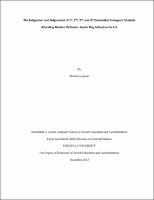Please use this identifier to cite or link to this item:
https://hdl.handle.net/20.500.12202/9056Full metadata record
| DC Field | Value | Language |
|---|---|---|
| dc.contributor.advisor | Pelcovitz, David | - |
| dc.contributor.advisor | Schnall, David | - |
| dc.contributor.advisor | Krakowski, Moshe | - |
| dc.contributor.author | Legesse, Shmuel Seifu | - |
| dc.date.accessioned | 2023-07-13T15:26:52Z | - |
| dc.date.available | 2023-07-13T15:26:52Z | - |
| dc.date.issued | 2023-06-27 | - |
| dc.identifier.citation | Legesse, S. S. (2023, June 27). The integration and adjustment of 1st, 2nd, 3rd, and 4th generation immigrant students attending Modern Orthodox Jewish day schools in the USA (Publication No. 30566562) [Doctoral dissertation, Yeshiva University]. PDTG. | en_US |
| dc.identifier.uri | https://hdl.handle.net/20.500.12202/9056 | - |
| dc.description | Doctoral dissertation, EdD / Open Access | en_US |
| dc.description.abstract | For Jewish immigrants to benefit from the resources and access job opportunities in the United States, they need to integrate. Acculturation is an important achievement in an immigrant's adaptation goals (Rosenthal, 2018) because it influences behavioral, affective, and cognitive functioning (Guler & Berman, 2019). Yeshiva schools were introduced in the United States to provide Jewish children with Jewish education while helping them acculturate and pursue secular higher education goals. The impact of minority schools on the acculturation of students varies. At the time of this study, there was little in the extant literature regarding U.S. Yeshiva school students' acculturation and how it influenced their life satisfaction, self-esteem, and GPA perception. The study sought to fill this gap. The aim was that study findings would yield information about how acculturation relates to the satisfaction, self-esteem, and academic achievement of high school adolescent students attending day Yeshiva schools, both natives and immigrants. The findings showed that acculturation influenced students' self-esteem, life satisfaction, and their perceptions of GPA. Immigrant students were found to be aware of the influence of the premigration culture, which shaped their emotional and mental efficacy in the host country. Acculturation knowledge was perceived as critical for behavioral and psychological adaption for upward or downward academic and social mobility. The critical role of minority institutions in the acculturation process and educational goals fitted the two-dimensional acculturation concept. Thus, a multicultural approach was found significant for students, parents, teachers, and acculturation practitioners when helping native and immigrant students fit into the U.S. culture. The findings imply that teachers in Yeshiva schools must embrace and explore new cultural experiences and diversity to boost life satisfaction, self-esteem, and academic satisfaction. | en_US |
| dc.language.iso | en_US | en_US |
| dc.publisher | Yeshiva University | en_US |
| dc.relation.ispartofseries | Azrieli Doctoral Dissertations;Publication No. 30566562 | - |
| dc.rights | Attribution-NonCommercial-NoDerivs 3.0 United States | * |
| dc.rights.uri | http://creativecommons.org/licenses/by-nc-nd/3.0/us/ | * |
| dc.subject | Educational leadership | en_US |
| dc.subject | Educational administration | en_US |
| dc.subject | Educational philosophy | en_US |
| dc.subject | acculturation | en_US |
| dc.subject | immigrant | en_US |
| dc.subject | life satisfaction | en_US |
| dc.subject | self-esteem | en_US |
| dc.subject | two-dimensional | en_US |
| dc.subject | Yeshiva | en_US |
| dc.title | The integration and adjustment of 1st, 2nd, 3rd, and 4th generation immigrant students attending Modern Orthodox Jewish day schools in the USA | en_US |
| dc.type | Dissertation | en_US |
| Appears in Collections: | Azrieli Graduate School of Jewish Education & Administration: Doctoral Dissertations | |
Files in This Item:
| File | Description | Size | Format | |
|---|---|---|---|---|
| Shmuel Legesse 2023 The Integration and Adjustment OA.pdf | 858.96 kB | Adobe PDF |  View/Open |
This item is licensed under a Creative Commons License

